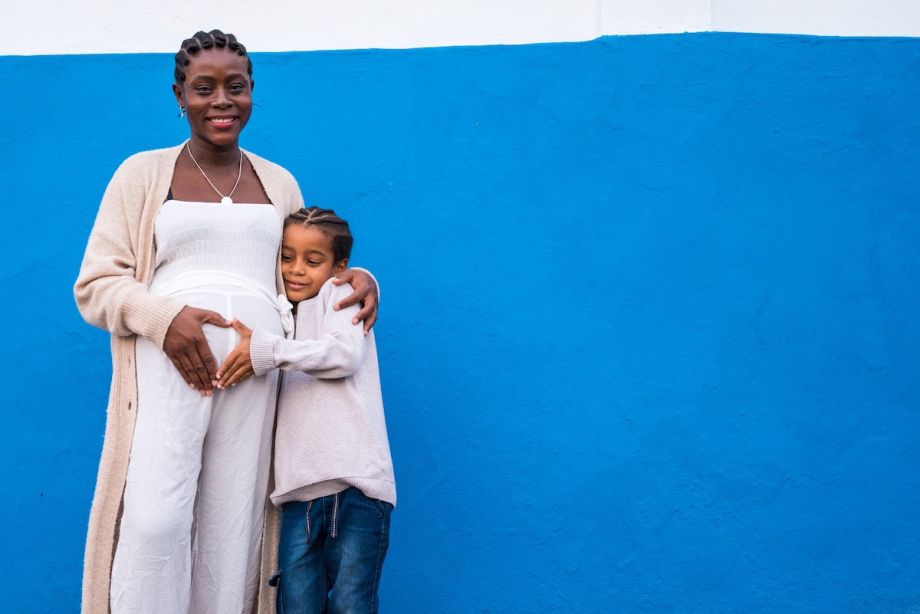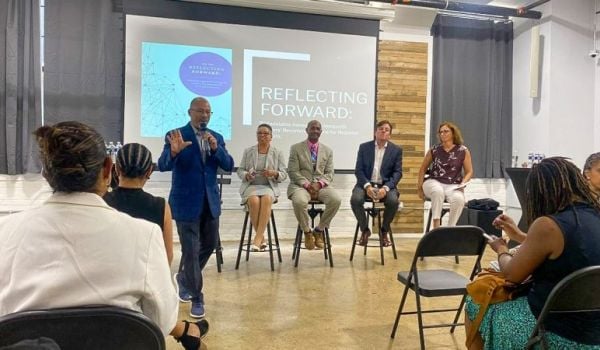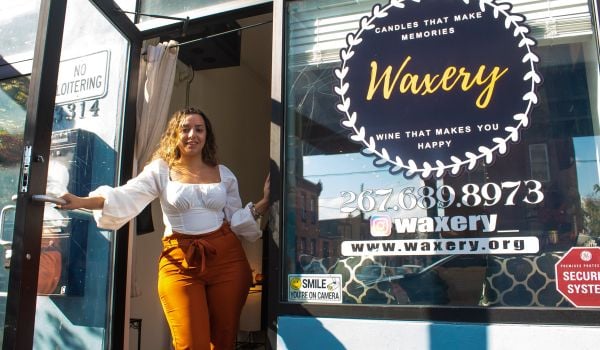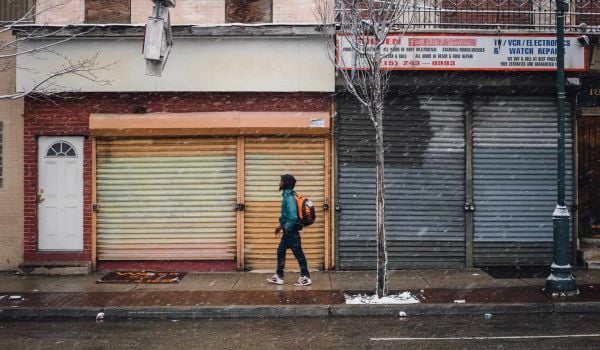Alex Harper was working at a Planet Fitness in Winnipeg when she became pregnant with her first child in the fall of 2022. When a friend heard the news, she told Harper about the Manitoba Prenatal Benefit, a program that’s been in place in the Canadian province since 2001 to provide pregnant women earning less than $32,000. These moms-to-be receive a monthly stipend of $80 (Can$) to use however they see fit — no strings attached. All women need to do is complete a form with their healthcare provider’s confirmation of the pregnancy.
A check for $80 (about $60 USD) may not seem like much. But Harper says the stipend, which she received as a check at the start of each month throughout her pregnancy, became a critical cushion — particularly when she became unemployed. And having the freedom to spend it on whatever she deemed necessary was that much more empowering.
Some months, she used it to buy healthy food with the kinds of nutrients women need during pregnancy; other times, she used it for bus fare to her prenatal appointments. Once, she used part of it to buy herself a yoga mat.
Beyond meeting the varying day-to-day needs of women, the program has what is arguably an even more important track record: It has shown a 17.5 percent reduction in infant prematurity. Infants born prematurely have higher rates of low birth weight, a factor that is closely associated with a host of physical and cognitive outcomes.
Philadelphia has the highest infant mortality rate among the country’s 10 largest cities — with Black babies, and their mothers, at greatest risk of poor birth outcomes. The data from Manitoba provided the evidence-based backbone for a new program set to launch here in 2024. Philly Joy Bank will give $1,000 a month for 18 months to 250 mothers, starting in pregnancy and going through baby’s first year.
The money will be unrestricted, which means the mothers can use it for whatever they need or want. If the program is like others across the country — including San Francisco’s Abundant Birth Project, currently the only U.S.-based program to target pregnant women — that could look like paying for necessities such as food and rent, and providing emotional relief to reduce the stress of making ends meet.
“We keep trying to solve the same problems with the same tools and it’s about time we tried something new, which is why unconditional cash is so exciting,” says Amy Castro, associate professor at University of Pennsylvania’s School of Social Policy & Practice and co-founder/faculty director of the Center for Guaranteed Income Research. “This is predicated on the assumption that people are the experts on their own lives and they know best what they need, what their families need, what their babies need.”
Community-Informed Plans
Around the U.S., there are about 140 universal basic income programs underway, addressing issues ranging from housing to parenting; over the last few years, Philly has rolled out a handful of pilot programs, like those designed to keep renters from being evicted.
To be clear, the qualifier “universal” is not literal — in any given pilot, there are criteria a recipient must meet to qualify for funds. And advocates for universal basic income argue that it should not replace other sources of income, other safety net programs, or other efforts to dismantle the inequitable structures that lay the groundwork for the striking income inequality in our country. Rather, the premise is that universal basic income (also dubbed guaranteed income) can be an impactful complement, a tool to make a dent in leveling the playing field for folks living in poverty.
The idea for Philly Joy Bank came about in 2021, through the work of the Philadelphia Health Department’s PhillyCAN, or “the CAN,” a group focused on reducing racial disparities and infant mortality in Philadelphia. The CAN has been around since 2015 and includes people from across sectors: government, social service agencies, nonprofits, payors, health systems, academic researchers, and community lived experience experts.
Lydia Seymour, the CAN Coordinator, says that in countless conversations with mothers and mothers-to-be of all backgrounds, the one common stressor that repeatedly came up was money. A further dive into numbers showed that $1,000 a month would meaningfully address the cost of living for the women the group was hoping to reach.
The mothers in Philly Joy Bank’s 18-month pilot will come from the three Philadelphia zip codes with the highest rates of infant low birth weights: Strawberry Mansion, Nicetown-Tioga, and Cobbs Creek. Initial funding for the project — more than $3 million, which will last for the course of the 18 months — came from William Penn Foundation and Spring Point Partners (also a funder of The Citizen). Last week, The Barra Foundation committed another $500,000. If the pilot is successful, the Philadelphia Health Department, which will oversee the program, may seek funding to support additional cohorts.
Pediatrician Stacey Kallem, director of Maternal Child Family Health at the Philadelphia Health Department, says the program’s genesis in lived-experience experts has been essential. Castro agrees: Working with the community is critical to the success of any guaranteed income program.
“If we do not figure out how to design these programs in a way that meets the needs of the most vulnerable, we’re going to create the next generation’s form of social inequality,” she says. Castro cites the child tax credit as an example: “The people who needed that money most got it last or didn’t get it at all,” she says. “When we’re talking about groups that are most marginalized — like mixed documentation-status households, families who are living in the margins, people who didn’t file taxes because they’re too poor to — those are the folks who missed out on these very benefits.”
Castro was involved with the research and evaluation of the heralded Stockton, CA, program that was one of the first U.S.-based universal basic income projects. She and her team are currently running 33 experiments around the U.S. related to universal basic income. In the next three to four years, they hope to have answers to some critical research questions: How much money is required to make change? How does the process of change shift based on policy or the cost of living in a given location?
Castro says her early research has led her to believe in the promise of universal basic income. But, she warns, “We need to be incredibly cautious that we’re making smart policy decisions.” Martin Luther King, Jr., advocated for universal basic income while he was still alive, but the history of these programs in action is incredibly new: Stockton’s was only launched in 2019, around the time another program targeted at mothers, Baby’s First Years, was launched.
Castro is heartened that, while their reasons for supporting it vary, policymakers from both sides of the aisle have rallied behind guaranteed income. (Lest we forget, it was Donald Trump who signed off on unconditional cash with the CARES Act.) But she believes the key to any program’s success will come down to human connection, trust-building.
With that in mind, Kallem and her team are still in the planning stages of implementation for Philly Joy Bank, but they envision using a multi-pronged approach to reach pregnant mothers: relying on social media and ads, yes, but leaning on trusted community groups and credible messengers, on the kind of lived-experience experts who helped dream up the project in the first place.
“A program like this almost sounds too good to be true,” Kallem says. “So one of our goals is to make sure that people have heard about it multiple times and know it’s legitimate.”
Measures of success
Kallem expects to measure a variety of outcomes — like access to prenatal care, maternal mental health, infant well-child visits, and parent-child interaction. If the data shows the kinds of improvement she and her colleagues are striving towards, she hopes to see policy change accordingly. “How can we take cash transfer programs that already exist, like the child tax credit, and either expand them or make them more guaranteed income-like? How can we leverage specific funding sources that already exist for maternal and child health outcomes specifically, for them to support guaranteed income?” Because for any intervention to work, its benefits need to be sustainable.
“I hope the Philly Joy Bank and other similar organizations can contribute to a cultural shift in how we think of taking care of people,” Kallem says.
Castro recognizes, as the data from Stockton showed, that the issue of agency may be most powerful when it comes to conversations around guaranteed income.
So often, she says, in order to get access to benefits, people are required to trade their dignity and their self-determination in exchange for what she calls “forced vulnerability.” “You are forced to make yourself vulnerable to a system that’s going to presume that it knows best about your life or about your baby or about your children. When we know full well that parents know best what their kids need.”
In contrast, she says, unconditional cash is not means-tested. “You receive it because you’re human,” she says. “And beyond that ethical commitment, it’s just pure logic: Needs fluctuate constantly by the season and at each stage of the lifespan. Your needs are dynamic and shifting — and the only thing that is as dynamic as life is cash. So it’s the flexibility of cash that provides agency for people to be able to set their own course.” And, she says, contrary to what detractors may predict about giving a man a fish versus teaching him to fish, similar programs have shown that women tend to use unrestricted funds not only for essentials, but to find better-paying jobs in better-paying environments.
“I often tell my students that budgets are moral documents. They’re a statement about what we value,” she says. “There are a lot of different ways that we can think about reknitting the safety net, and I really do think that we are at a crossroads in the U.S., where things that even three years ago we thought were impossible are suddenly up for debate in some pretty beautiful ways.”

Jessica Blatt Press is the Philadelphia Citizen's director of special projects. An award-winning journalist and editor, her work has appeared in O: The Oprah Magazine; Glamour; Redbook; Parents; The New York Times; The Philadelphia Inquirer; Scholastic; Seventeen; and more.
















